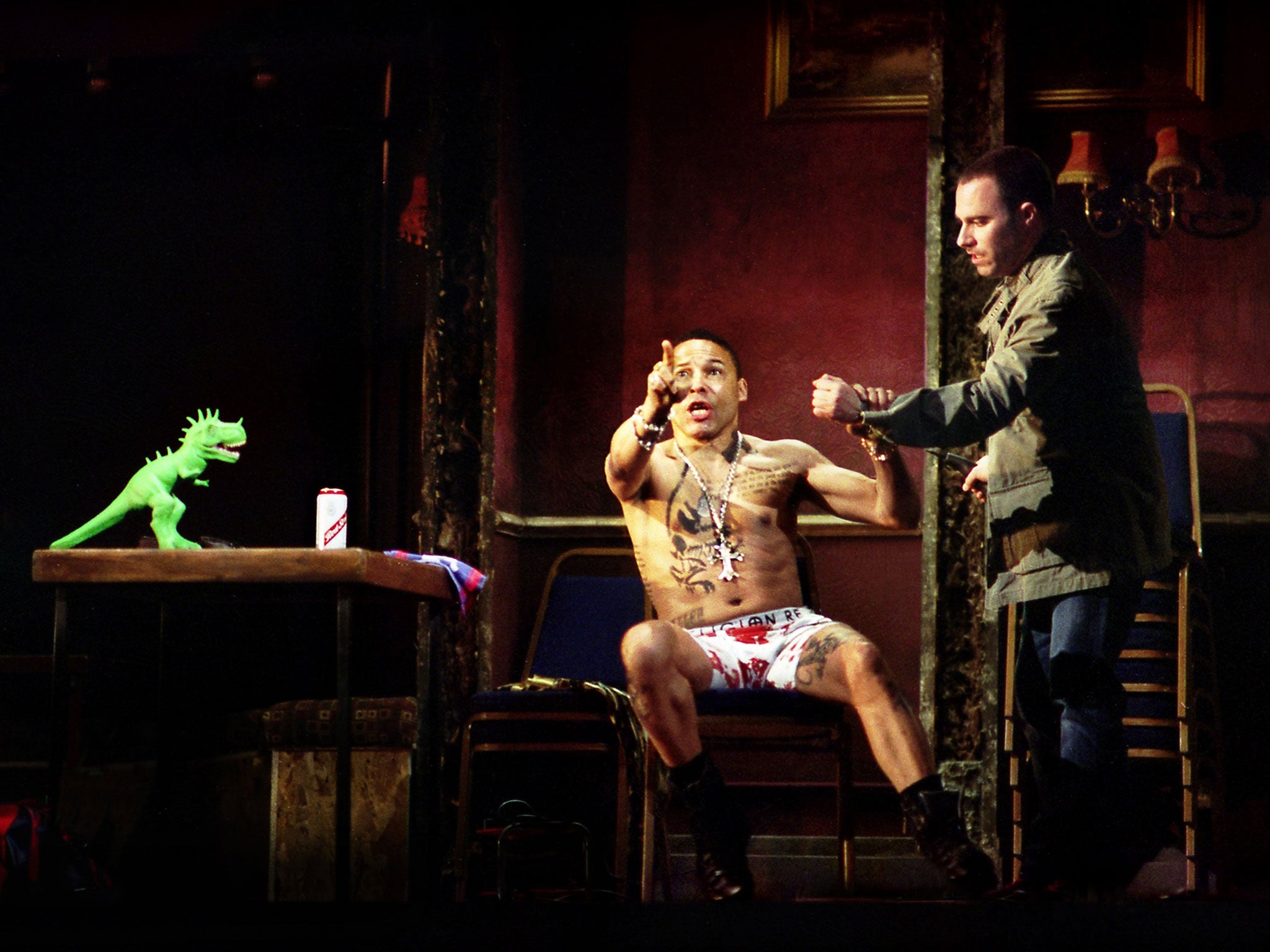Classical review: Wozzack, The Helmand years
ENO's new production of Berg's 1925 opera draws parallels with servicemen's lives in Afghanistan

Three years ago, on a train to Newcastle, I met a young soldier on leave from Helmand.
We fell to talking about his childhood and his schooling, his disillusionment with an unwinnable war, his difficulty in sourcing a rucksack adequate to scrambling belly-down over rough ground, his admiration for the sophistication of IEDs fashioned from drinks cans, the desperate loneliness he felt when he went home to his Nan’s. I asked him what had made him join the army. It was that or crime, he said.
Carrie Cracknell’s ENO production of Wozzeck is set in a modern-day garrison town where crime and military service have been blurred by poverty. In the tawdry bar on the lowest level of Tom Scutt’s three-storey set, the tattooed Captain (Tom Randle) slurps lager, smarting at the snag of the hair-clippers that Wozzeck (Leigh Melrose) ineffectually wields. Demobbed or on leave, Wozzeck combines his work as a barber with stuffing bags of cocaine into toy dinosaurs, submitting to dietary experiments for extra cash to give his lover, Marie (Sara Jakubiak). The experiments are just a hobby for the Doctor (James Morris), kingpin of the local drugs trade. All of the money here is dirty, the pomp of military funeral processions dissolving into drunken karaoke and furtive hand-jobs. In a room on the first floor, Andres (Adrian Dwyer) tests the turning-circle of his wheelchair, an amputee haunted, like Wozzeck, by spectres of Afghan children and stumbling soldiers, their faces masked against chemical attack.
With the exception of the children, who appear so frequently in neat formation that you half expect them to break into a number from Annie, Cracknell’s staging is impressive in balancing the grotesque and the banal. Melrose’s Wozzeck is a small, quiet, inexpressive figure, his paranoia concealed until his jealous crack-up, and all the stronger for it. The physical contrast between him and Bryan Register’s barrel-chested Drum Major is startling. Dazzled by the bling the Drum Major leaves on her kitchen table, bored, weary, feckless Marie yields easily, her prayers to the Virgin Mary hollow. Jakubiak has an ample, expressive, flexible voice and soars confidently over Alban Berg’s brazen orchestration. Mahlerian in its angry beauty, its brilliant shards of woodwind, its mournfully sensual violin solos and slow-dancing basslines, the score is terrible and radiant, and given an outstanding performance from Edward Gardner and the orchestra.
Wozzeck is an example of ENO at its provocative best, with proper thought given to every role, from Clare Presland’s brittle, doll-like Margret to Harry Polden’s numbed child, stepping over the corpses of his parents, cocaine-stuffed dinosaur in his hands. Though the war Cracknell invokes is vastly different from the one that inspired Berg, the transposition works.
Another conflict hangs over Benjamin Britten’s Canticles (Theatre Royal, Brighton ****), staged by Neil Bartlett and Paule Constable with Frantic Assembly. Written in 1947, the first in this set of five cantatas looks back to the early flowering of Britten’s relationship with the singer Peter Pears, whose vocal qualities would inform so much of his music. As tenor Ian Bostridge curls his fluting, anxious voice around the tender words of the text, standing in the curve of Julius Drake’s grand piano, actor Edward Evans carefully sets a table for breakfast for two, enchanted and intimidated by his new, more confident, more handsome lover (Edward Evans). The pas de deux of the second Canticle, “Abraham and Isaac” is more complex, its narrative sharp and ironic as counter-tenor Iestyn Davies’s cool, effortless tone highlights Bostridge’s angularities and idiosyncracies.
While Britten and Pears were falling in love in America, Edith Sitwell was writing the poem that would become Still Falls the Rain – The Raids, 1940, Night and Dawn, sung here by Bostridge to John Keane’s film of falling bombs and munitions factories staffed by women. In Journey of the Magi, the ensemble between Bostridge, Davies and baritone Benedict Nelson is, to use TS Eliot’s term, “satisfactory”, while The Death of Saint Narcissus, sees tenor, harp (Sally Pryce) and dancer (Dan Watson) conjure an Aschenbachian fantasy of doomed beauty.
An imaginative footnote to the Britten centenary, but one in which first love is more arresting than anything that follows.
‘Wozzeck’ (020-7845 9300) to 25 May. ‘Canticles’ : ROH, London WC2 (020-7304 4000) from 10 July
Critic's Choice
Mitsuko Uchida joins Quatuor Ebène in Mahler songs, Franck’s Piano Quintet in F minor and Jacob Ter Veldhuis’s I was like, WOW!, at London’s Queen Elizabeth Hall (Sunday/tomorrow). Opening the Bath Music Festival, Alexander Janiczek directs the strings of the Scottish Chamber Orchestra in music by Stravinsky, Tchaikovsky and Arvo Pärt, at Bath Abbey (Wed). The London Contemporary Orchestra performs work by Claude Vivier in London’s disused Aldwych Underground station (Fri).
Join our commenting forum
Join thought-provoking conversations, follow other Independent readers and see their replies
Comments
Bookmark popover
Removed from bookmarks